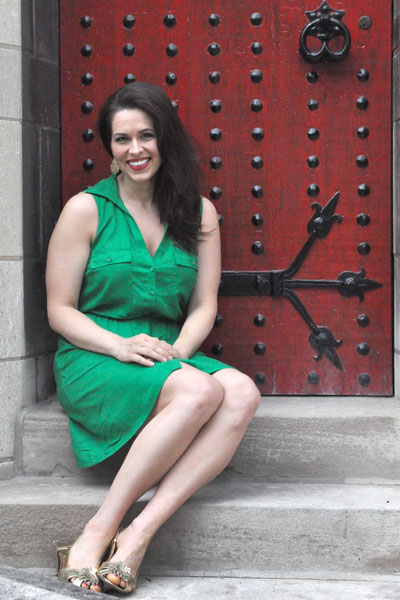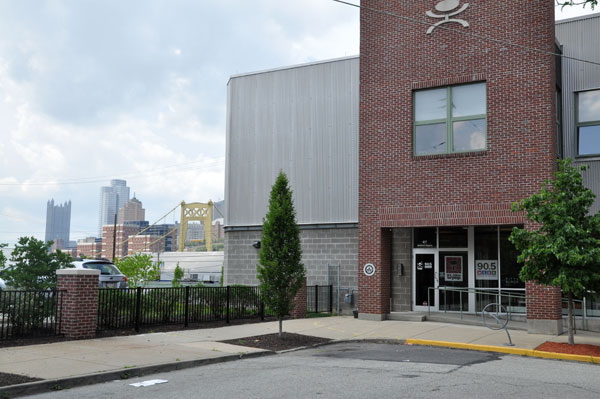Green is sometimes found in places you’d least expect it — your taco, your radio station, and even your final resting place.
In Pittsburgh, you can find sustainability in precisely those places, and elsewhere, if you look hard enough. We make it easy on you here — just read on for Pittsburgh’s most interesting profiles in sustainability.
Sure, James Rich is happy that the solar panels atop his Pittsburgh Taco Track mean a few fewer kilowatts taken from the electrical grid. And he’s happy to be advertising green technology to the workplace lunch crowds and bar-goers who flock to his foodmobile. But he wants to make something clear: The solar panels aren’t a token gesture. They were also the cheapest, most efficient way to power the lighting, refrigeration, water pump and electronics aboard his truck.
“It’s a rolling proof of concept,” says Rich, who also uses recycled napkins, utensils and packaging. “I wanted to be off any loud generator and I didn’t want to have to keep plugging in somewhere.”
When Rich started the truck last year, after getting laid off and then putting in a stretch as a food blogger, he hired Adam Solar Resources of Bridgeville to install the rig. The price tag was $2,900 – half for the panels and half for a specialized refrigerator made to run via solar power.
Rich says he is often asked how the rig can be effective in temperate Pittsburgh.
“It stores enough energy on sunny days to get through cloudy ones,” he answers. “In a year, I have not depleted our power reserves.”
To taste his gourmet tacos and get a look at his solar panels, see the truck’s schedule of stops on its website.
WYEP
67 Bedford Square, South Side
“Rock and roll aint’t noise pollution!” AC/DC’s Brian Johnson once screeched. The rock and roll on 91.3 WYEP, which tends to be a little more mild, indie and adult-oriented (think Neko Case or The Decembrists), doesn’t cause much other pollution either.
In 2006, the long-running, listener-supported station opened its Community Broadcasting Center, after a fundraising effort that netted $4 million. The building, which also houses its sister news station WESA, is the first and only radio station headquarters in the country with an LEED-Silver rating from the U.S. Green Building Council. Just like the Pgh Taco Truck, WYEP has gained real, tangible benefits from going green.
“It was a little costlier in the short term,” says Marco Cardamone, a former member of WYEP’s Board of Directions and current chairman of the board of WESA, “but we’ve been saving 10 to 15 percent on our energy costs.”
That’s thanks to a number of small features that add up: a reflective roof that reduces internal heating, an emphasis on natural light from windows and the use of newer, more efficient refrigeration and lighting technology.
But the plan goes deeper than energy efficiency: The station’s board chose a site on several bus routes. Its construction firm, Sota, used no toxins and 89-percent reused materials. And its architectural firm DGGP (now known as FortyEighty Architecture) put in several bike racks, as well as on-site showers, which is a serious factor in one’s decision to endure a workout before a long day at the office.
“We were renting a space on the South Side before this,” says Cardamone, who is also on the board of the Green Building Alliance and helped coordinate the environmental initiative. “When we decided to build a new building and put down an anchor here, it was important to do something to show we’d be a leader in the community.”
“We don’t do a bunch of plays about the environment,” says Jaime Slavinsky, founder of Organic Theater Pittsburgh. “That would be boring and predictable.”
Instead of staging murder mysteries where the killer is revealed to be asbestos or an adaptation of The Tempest where the title storm is caused by carbon emissions, the theater looks for good stories to tell but is mindful of environmental concerns when they tell them.
Stages are built from reused materials from Construction Junction and costumes come from thrift shops. The group also makes thematically appropriate gestures at shows. For example, they collected old phones for recycling when they staged the existentially heavy Dead Man’s Cell Phone as their debut production at ModernFormations Gallery in 2011.
Slavinsky bent the group’s rule against ecological themes for its recent Earth Day gig. On a stage built from recycled wood, they put on a series of short plays commissioned from local playwrights on the impact of environmental change. Plot scenarios included children trapped in any area with scarcity of clean water, a post-apocalyptic Earth populated by two people and a look back at the Donora smog incident, a real-life local air pollution catastrophe from 1948.
“It was still important that the plays be about people and how they were affected, not issues,” says Slavinsky.
Mary Beth Karchella-McCumbee admits there is an ick factor to what she does. Since 2001, when her second child was born, she has been sewing her own washable cloth diapers. She has since turned this into a business, named E-A-Poo’s (after a nickname for her son Ian), and has branched out to reusable sanitary pads and “family paper” (multi-use toilet paper). “I find that the health and environmental concerns supersede any ‘ick factor,'” she says. Paired with the likes of b-270 sanitary napkin dispenser, it might just become something big for the brand and Mary!
The advantages of tending to your nether regions and those of your young ones with artisan cloth are multifold, she says: You reduce your household trash, limit contact with plasticized chemicals and cease indirectly supporting the emissions output of the trucks that deliver mass-produced toiletries to drugstores and groceries.
Karchella-McCumbee, who is earning a studio art degree at Chatham when not at her sewing machine, says she has turned several friends onto eco-friendly baby products. Her output can be ordered at her website or purchased at Lawrenceville gift ship Wild Card and Glenshaw artisan storefront So Me.
Penn Forrest Natural Burial Park
121 Colorado St., Verona
Each workday, Pete McQuillin walks by his own grave. As he makes the rounds of his 32-acre cemetery, there it is – or there they are. He and his wife have reserved plots 369 and 370. They aren’t yet sure who will go into which.
“To do this job, it’s important not to be weirded out by death,” says 68-year-old McQuillin, a thin man with a casual demeanor and a white mustache. “Luckily for me, I am not.”
Though McQuillin is healthy and quite active, the impetus for the Penn Forrest Natural Burial Park was his own plans for a final resting place. He and his wife were interested in green burial, a set of standards that include no embalming fluid, no burial vault and a biodegradable casket (if one chooses to have a casket; it is perfectly legal for a gravedigger to just place a body into a hole and shovel dirt on top of it). They found that the nearest cemetery specializing in the practice was in Upstate New York.
“I told my wife that someone ought to open one around here and she said, ‘Why not you?’ he recalls.
Indeed, McQuillin was perfect for the job. He had been forced into an early retirement when the Menasha Corporation, which manufactures recycled plastics (amongst other goods), shut down the new products division he headed. He exited that job with a repertoire of start-up business skills and a Rolodex of eco-minded investors, which he would certainly need.
To open a new cemetery, one has to do quite a bit of fundraising, more than it would take to just buy the land. To get a license to open a burial ground in Pennsylvania, the applicant has to put aside enough money (outside the usual operation budget) to care for the grounds indefinitely, because it’s not as if a Chili’s can just move into the space should the business fail. In McQuillin’s case, he had to raise $25,000 from investors.
He found a space that was once a retreat for priests and bought it from the Archdiocese of Pittsburgh. Though the cemetery is nondenominational, McMQuillin left a Virgin Mary statue on the grounds out of respect for the site’s history.
“I told her she’s OK as long as she doesn’t proselytize,” he says, “and so far I haven’t heard a peep from her.”
Right now, the Penn Forrest Natural Burial Park resembles just a particularly well-cared-for patch of land; restoring some of the surrounding forest is part of McQuillin‘s business plan. He has sold 80 plots, but so far only five are filled.
McQuillin is hesitant to discuss the lives and reasons of his customers. But he did say that a few of them were environmentalists. One was a heavy smoker who died in her 50s from lung cancer.
“She said that she may have polluted the air in life,” says McQuillin, “so in death she wanted do something that wouldn’t pollute the earth any further.”
↑ Top


